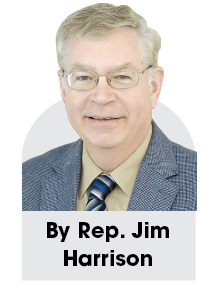
The past few weeks at the State House have been anything but quiet. Last week, House leaders pushed through over $130 million in new taxes and fees alone for various spending priorities. The governor has not minced words as to what he views as the Legislature making Vermont unaffordable. A group of House Republicans suggested that state spending was off the rails.
The governor invited a small business owner, Amanda Shangraw of Williamstown, to his weekly press conference last Wednesday. She made an impassioned plea to lawmakers to stop raising taxes and overregulating family businesses, such as hers.
House Majority Leader Emily Long, D-Newfane, shot back, “I guess it’s obvious that it’s an election year! Unfortunately, turning up the heat and delivering over-simplified political rhetoric doesn’t help anyone and it certainly doesn’t help Vermonters.”[See her opinion, page 10.]
The reality is that there are major differences in their respective approaches to what is best for Vermont. The House did pass significant spending increases last week for public housing initiatives, judicial staffing, Medicaid expansion and more. What was perhaps a bit different this year is that most of the increases were passed in separate legislation along with the necessary tax hikes to pay for them. The state budget bill itself (arguably the only bill that really must pass in any session), was largely clear of the major spending hikes and did not by itself require new taxes. Had it not been for a significant expansion of the hotel voucher program added to the budget bill at the last minute, I may have considered supporting it. However, that measure will most certainly require tax hikes going forward. And to clarify, I opposed the bills with major tax hikes last week.
We have a long way to go before the various tax and spending bills reach the governor’s desk. The Senate may have different views on what taxes to raise.
One of the tax increases included in House-passed bills is a surcharge on higher income families. There have been some signals that the Senate may take a different approach with it. According to the legislative fiscal office, the top 1% in the state currently pay 30% of Vermont’s personal income taxes. If Vermont becomes the state with the second highest income tax rate (California is No. 1), who will make up some of the 30% if any move or declare their residency elsewhere?
The other elephant in the room is what is going to happen to school taxes this year and in the future. There are discussions taking place on how to change funding formulas as well as adding other new taxes to take some pressure off property taxes, which are expected to increase significantly this year due to school spending hikes. Finding consensus could be difficult.
As we enter the final third of the 2024 session, I hold out hope that we can find a quieter path forward with the governor and legislative leaders on the key issues before us.
Other items of interest:
In a marathon session last Wednesday, March 27, the House approved changes to Vermont’s land use law, Act 250. A total of 10 amendments were offered by various legislators, many from rural areas of the state. One of the main complaints of the bill, H.687, was the potential for additional areas of the state that would be subject to Act 250 review for new developments. Unless modified by the Senate, the legislation will likely face a veto by the governor. In a statement, Scott said, “I believe rural Vermonters deserve affordable housing as much as those in Burlington and Montpelier. H.687 suggests otherwise and sets the state up for years of inaction, at a time when we need to move swiftly to support the housing needs of all Vermonters.”
Scott expressed support for a public safety bill, S.58, which passed the Senate last week. The bill increases penalties on drug traffickers when death results from drugs with fentanyl and xylazine and it also further delays the “raise the age” which would have allowed more young adults to be treated as minors for violent offenses.
The Progressive Party has expressed opposition and the Democratic Party shared grave concerns regarding the governor’s choice of Zoie Sanders as the new Secretary of Education. Her past employment with a for-profit charter school organization, even though she is currently with a large public school district in Florida, appears to be the target of the criticism. As the secretary needs approval by the Vermont Senate, her appointment has the potential of becoming political. Scott has expressed dismay that some are making assumptions and levying attacks on her character without even meeting or speaking with her.
Legislation to invest in public housing coupled with tax increases in the property transfer tax and income tax on high earners was approved by the House at the end of last week. The bill, H.829, also includes new protections for tenants with help with legal representation and some funding for help with back rent. When the Legislature returns on Tuesday, the House will consider a Progressive-led amendment that would add a “Just Cause Eviction” requirement on landlords as part of a housing bill, H.829.
The House approved a new task force to look at how Vermont might fund a new program for school construction in the future. A recent analysis estimated that Vermont faces nearly $6 billion in school construction needs.
The Senate Health & Welfare Committee has begun deliberations on the House-passed safe injection sites legislation, H.72. Governor Scott has indicated he believes it sends the wrong message about illegal drug usage.
Rep. Jim Harrison is the state representative for Chittenden, Killington, Mendon, and Pittsfield. He can be reached at [email protected] or harrisonforvermont.com.



